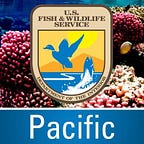Working for the Outcome: Conservation for Future Generations — Narrissa Brown
By Jordan Akiyama, Public Affairs Specialist, USFWS
They say the best jobs are the ones that don’t feel like a job. They’re the jobs that allow you to live out a childhood dream, make you feel complete, and know you are making a difference. One biologist, working for the U.S. Fish and Wildlife Service, feels lucky to be in one of those kind of jobs.
Narrissa Brown knew from an early age that she wanted to help preserve our ocean waters. Growing up in Kawaihae on the western side of the island of Hawaiʻi, where, according to Narissa, there wasn’t a lot to do except spend time at the beach. She and her siblings spent every weekend and every summer day playing at the beach and observing the local marine life.
“Kawaihae is sort of a blink and you’ll miss it town,” said Narissa. “I think there’s a gas station, a couple of restaurants and that’s it. So, there’s not really a lot to do there but the coral reefs in the area are just some of the bests in the world. And the place that my mom used to take us is near Kawaihae Harbor, you wouldn’t think there would be a lot of coral diversity in the harbor, but there is quite a bit.”
Narrissa’s passion for studying marine life began at an early age. One of her most vivid memories involves a close encounter with a shark. She recalls swimming with a friend out to some pylons in Kawaihae Harbor when suddenly she saw a shark swim by.
“It was a pretty good-sized shark,” said Narrissa. “I didn’t know at the time, but after looking it up realized it was a tiger shark. I remember getting down on my stomach and being in awe of this thing going by. Everyone else was just screaming and freaking out, but I was so fascinated. I went back home and told my mom that I need to find a book about sharks. That was defiantly the experience that fueled my passion to study marine life.”
Originally wanting to study how disease and human impact affected marine life, her focus shifted when she realized that every system was interconnected to one another and that she needed to learn them all. Gaining her undergraduate degree in biology and focusing her master’s degree on coral reef health and genetics, Narrissa is currently on her way to earning a doctorate in zoology. A path that she now admits comes with much more responsibility than just research.
“I now realize that it comes with a lot of responsibility, because I’m not just speaking my own thoughts and ideas,” said Narrissa. “I have a responsibility to the place that I’m from, the culture that I’m from, and the plants and animals I help protect. The Hawaiian world view is that land is chief and we are the servants. In the Native Hawaiian culture, our genealogy, our origin is tied to the ocean. The creation chant, the Kumulipo, says life on earth emerged from the ocean and the first being they recognize is a coral. And as a coral biologist, finding that out I was so excited. And the actual first line says, ‘And born was the coral polyp that one which gave birth to the coral reef.”
But this responsibility is one she is willing to take if it means ensuring that the experiences she had a child are there for her daughter and future generations. Narrissa is excited to pass on her knowledge, especially to her niece who wants to be a marine biologist when she grows up. And while this fills Narrissa with joy, she also admits she is also a little sad because she doesn’t want them to only experience them through the pages of a book.
“I want them to be able to go to an ocean and put their heads underwater with a snorkel and hear the same things I hear, because coral reefs are not a quiet place,” said Narrissa. “Coral reefs should like downtown at rush hour. There should be snapping shrimp, there should be fish swimming everywhere, there should be all kinds of noises. And unfortunately, in a lot of places, when we lose coral reefs, we’re losing all the species that come along with them. And I worry that future generations aren’t going to know what healthy looks like.”
While she realizes her work is far from over, Narrissa’s goal is to be a mentor for those who want to take up the conservation battle after she has retired from the service. For now though, she is keeping her yes focused on her work in coral reef preservation and marine conservation.
“[Working for] Fish and Wildlife is a great job,” said Narrissa. “While there are people who work for the income, we work for the outcome. I look at the work that still needs to be done and I get this weird sense that I can’t retire until at least this and this is done. And I see other biologist making the same goals and priorities, and it’s making me realize the work is never really done. Honestly, I would love to work myself out of a job. If we could recover all the species by the time I’m ready to retire, that would be awesome. The best you can hope for is to find other people that share your passion and share that same love of conservation and build a coalition. The job never ends, and the best I can hope for is to find other people that is just as passionate as me.”
The U.S. Fish and Wildlife Service works with others to conserve, protect, and enhance fish, wildlife, plants, and their habitats for the continuing benefit of the American people. For more information, connect with us through any of these social media channels at https://www.facebook.com/PacificIslandsFWS, www.flickr.com/photos/usfwspacific/, or www.twitter.com/USFWSPacific.
